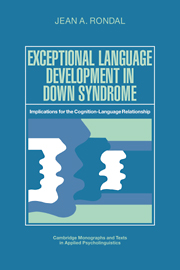 Exceptional Language Development in Down Syndrome
Exceptional Language Development in Down Syndrome Book contents
- Frontmatter
- Contents
- Foreword by Neil O'Connor
- Acknowledgments
- 1 Introduction
- 2 Language development in Down syndrome
- 3 Exceptional language development in mentally handicapped individuals
- 4 Cognition-language relationships and modularity issues
- 5 A case study
- 6 Theoretical discussion
- 7 General conclusions
- Appendixes
- References
- Index
2 - Language development in Down syndrome
Published online by Cambridge University Press: 23 December 2009
- Frontmatter
- Contents
- Foreword by Neil O'Connor
- Acknowledgments
- 1 Introduction
- 2 Language development in Down syndrome
- 3 Exceptional language development in mentally handicapped individuals
- 4 Cognition-language relationships and modularity issues
- 5 A case study
- 6 Theoretical discussion
- 7 General conclusions
- Appendixes
- References
- Index
Summary
Detailed reviews of the literature on the development of speech, language, and communication skills in persons with DS and other mental handicaps are readily available (e.g., Gunn, 1985; Rondal, 1985a, 1988a, 1988b; J. Miller, 1987; C. B. Mervis, 1988; Dodd & Leahy, 1989; Barrett & Diniz, 1989). The following presentation, therefore, will only summarize major data. (For an update on the general problems of DS envisaged in a developmental-organizational perspective, see the contributions gathered by Cicchetti & Beeghly, 1990, including their own review chapter.)
A general indication in the specialized literature has sometimes been for DS to be more detrimental to language development than are other syndromes leading to mental retardation (e.g., Zisk & Bialer, 1967; Gibson, 1981). Exact reasons and detailed supporting analyses for this claim have never been provided, however, and there are opposing views (e.g., Evans & Hampson, 1968). Nevertheless, a number of observations may be recalled (also J. Miller, 1987) in relation to the important speech and language deficits in DS persons. None of them are pathognomonic of DS, but their accumulation in this syndrome is remarkable.
Language-related deficiencies in Down syndrome
Two series of problems may be envisaged: first, organic malformations and difficulties affecting speech; second, central processes of a cognitive nature.
- Type
- Chapter
- Information
- Exceptional Language Development in Down SyndromeImplications for the Cognition-Language Relationship, pp. 3 - 18Publisher: Cambridge University PressPrint publication year: 1995
